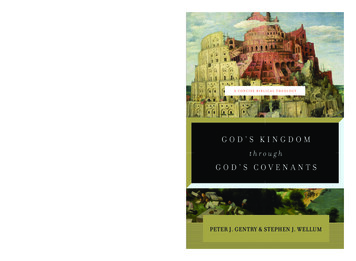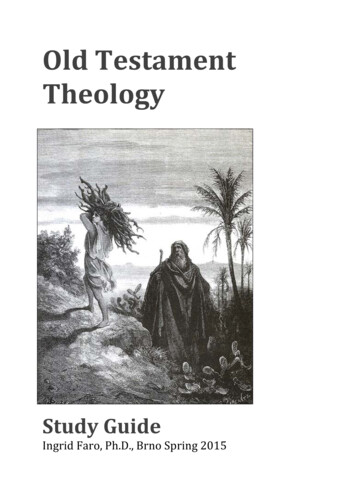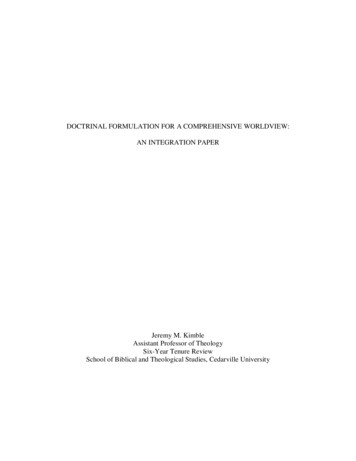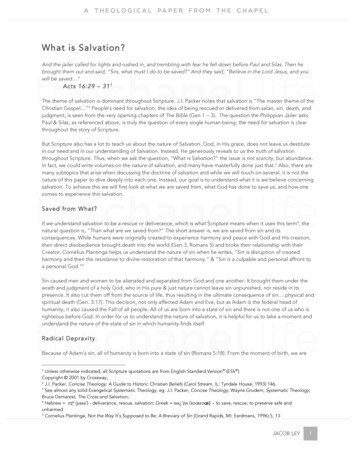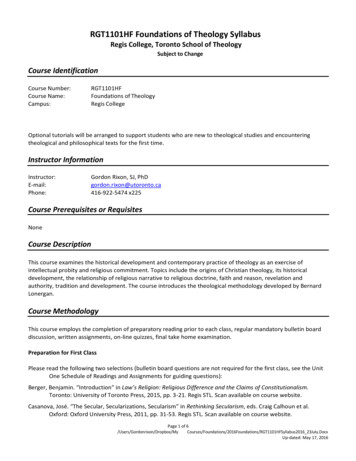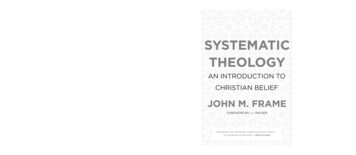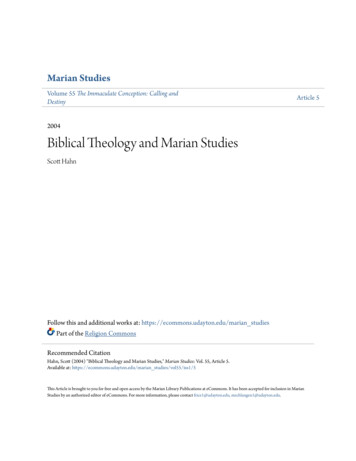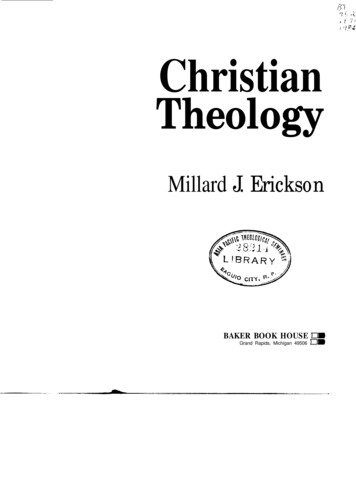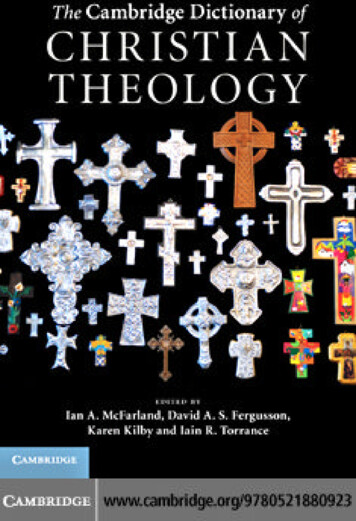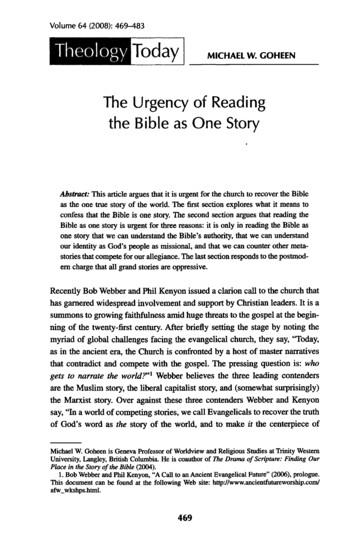
Transcription
Volume 64 (2008): 469- 83Theology TodayMICHAEL W. GOHEENThe Urgency of Readingthe Bible as One StoryAbstract: This article argues that it is urgent for the church to recover the Bibleas the one true story of the world. The first section explores what it means toconfess that the Bible is one story. The second section argues that reading theBible as one story is urgent for three reasons: it is only in reading the Bible asone story that we can understand the Bible's authority, that we can understandour identity as God's people as missional, and that we can counter other metastories that compete for our allegiance. The last section responds to the postmodern charge that all grand stories are oppressive.Recently Bob Webber and Phil Kenyon issued a clarion call to the church thathas garnered widespread involvement and support by Christian leaders. It is asummons to growing faithfulness amid huge threats to the gospel at the beginning of the twenty-first century. After briefly setting the stage by noting themyriad of global challenges facing the evangelical church, they say, "Today,as in the ancient era, the Church is confronted by a host of master narrativesthat contradict and compete with the gospel. The pressing question is: whogets to narrate the world?"1 Webber believes the three leading contendersare the Muslim story, the liberal capitalist story, and (somewhat surprisingly)the Marxist story. Over against these three contenders Webber and Kenyonsay, "In a world of competing stories, we call Evangelicals to recover the truthof God's word as the story of the world, and to make it the centerpiece ofMichael W. Goheen is Geneva Professor of Worldview and Religious Studies at Trinity WesternUniversity, Langley, British Columbia. He is coauthor of The Drama of Scripture: Finding OurPlace in the Story of the Bible (2004).1. Bob Webber and Phil Kenyon, "A Call to an Ancient Evangelical Future" (2006), prologue.This document can be found at the following Web site: http://www.ancientfutureworship.com/afw wkshps.html.469
470Michael W. Goheenjgjjjl bday Evangelical life."2 Thus, the first section is titled "On the Primacy of BiblicalNarrative." Getting this straight, they believe, is thefirstorder of business.I agree, and in this article I want to address the urgency of reading the Bibleas one story today. I will briefly unfold the confession that the Bible tells thetrue story of the world. Then I will discuss the issue of why it is so importantto grasp this truth. Finally, I will offer a brief answer to the postmodern chargethat all grand stories are necessarily oppressive.The Bible Tells One StoryAll of human life is shaped by some story. Alasdair Maclntyre offers an amusing story to show how particular events receive their meaning in the context ofa story.3 He imagines himself at a bus stop when a young man standing next tohim says, "The Latin name of the common wild duck is histrionicus, histrionicus, histrionicus." One can understand the meaning of the sentence, but whaton earth is the young man doing in uttering it in thefirstplace? This particularaction can be understood only if it is placed in a broader framework of meaning, a story that renders the saying comprehensible. Three stories could makethis particular incident meaningful. First, the young man has mistaken the manstanding next to him for another person he saw yesterday in the library whoasked, "Do you by any chance know the Latin name of the common duck?"Or he has just come from a session with his psychotherapist who is helpinghim deal with his painful shyness. The psychotherapist urges him to talk tostrangers. The young man asks, "What shall I say?" The psychotherapist says,"Oh, anything at all." Or he is a Soviet spy who has arranged to meet his contact at this bus stop. The code that will reveal his identity is the statement aboutthe Latin name of the duck. The meaning of the encounter at the bus stopdepends on which story shapes it. In fact, each story will give the event a different meaning.It is like that with our lives: "The way we understand human life dependson what conception we have of the human story. What is the real story ofwhich my life story is a part?"4 What Lesslie Newbigin is referring to here isnot a linguistically constructed narrative world that we fabricate to give meaning to our lives but an interpretation of cosmic history that gives meaning to2. Ibid., "On the Primacy of Biblical Narrative."3. Alasdair Maclntyre, After Virtue (Notre Dame, IN: University of Notre Dame Press,1984), 210.4. Lesslie Newbigin, The Gospel in a Pluralist Society (Grand Rapids: Eerdmans, 1989), 15.
The Urgency of Reading the Bible as One Story 4 7 1[Todayhuman life. Ν. T. Wright says that "a story . . . is . . . the best way of talkingabout the way the world actually is."5The Bible tells one unfolding story of redemption against the backdrop of6creation and humanity's fall into sin. But I want to say more: the story it tellsclaims universal validity. Chris Wright puts it this way:That the Old Testament tells a story needs no defense. My point is muchgreater however. The Old Testament tells its story as the story or, rather,as part of that ultimate and universal story that will ultimately embracethe whole of creation, time, and humanity within its scope. In otherwords, in reading these texts we are invited to embrace a metanarrative, a7grand narrative.Or as Ν. T. Wright correctly notes, the divine drama told in Scripture "offers8a story which is the story of the whole world. It is public truth."Thus, when we speak of the biblical story as a narrative, we are making a nor mative claim: it is public truth. It is a claim that this is the way God created theworld; the story of the Bible tells us the way the world really is. Thus, the bibli cal story is not to be understood simply as a local tale about a certain ethnic groupor religion. It begins with the creation of all things and ends with the renewal ofall things. In between it offers an interpretation of the meaning of cosmic history.It, therefore, makes a comprehensive claim; our stories, our reality—indeed allof human and nonhuman reality—must find its place in this story.In his Mimesis Erich Auerbach makes the striking contrast between Homer'sOdyssey and the Old Testament story. Speaking of the biblical story, he says:Far from seeking, like Homer, merely to make us forget our own realityfor a few hours, it seeks to overcome our reality: we are to fit our own lifeinto its world, feel ourselves to be elements in its structure of universalhistory. . . . Everything else that happens in the world can only be con ceived as an element in this sequence; into it everything that is knownabout the world . . . must be fitted as an ingredient of the divine plan.95. N. T. Wright, The New Testament and the People of God (London: SPCK, 1992), 40.6. One could argue for the narrative unity of Scripture on three bases: (1) formation of thecanon, which presupposes the narrative unity of a collection of books; (2) the tradition of thechurch reading Scripture as one story; and (3) warrant from Scripture itself. Of course, the last ismost important. An excellent summary of that scriptural authorization can be found in RichardBauckham, "Reading Scripture as a Coherent Story," in The Art of Reading Scripture, ed. Ellen F.Davis and Richard B. Hays (Grand Rapids: Eerdmans, 2003), 40-47.7. Christopher J. H. Wright, The Mission of God: Unlocking the Bible's Grand Narrative(Downers Grove, IL: InterVarsity Press, 2006), 54-55.8. N. T. Wright, New Testament and the People of God, 41-42.9. Erich Auerbach, Mimesis: The Representation of Reality in Western Literature (Princeton,NJ: Princeton University Press, 1968), 15.
472Michael W. Goheen¡TodayNormally when we read stories like the Odyssey, we suspend our disbelief andenter its world for a time. We emerge on the other side, exit the story and itsworld, and resume our daily Uves. Hopefully we have learned something orbeen entertained or enriched in some way by the story, receiving something wecan take into our "real" world. It is not that way with the biblical story; we areto remain in its world,findthe meaning of our lives there, and fit our lives intoits narrative structure. It claims to be the real world. In the words of GerardLoughhn, the biblical story is "omnivorous": it seeks to overcome our reality.10Auerbach finds this understanding of the Old Testament to be "tyrannical"because of its insistence that "it is the only real world." While I would partcompany with Auerbach on his charge of tyranny, he does have itrightthat theOld Testament claims to be the only real world.And yet it is often the case that Christians do not see the Bible as one story.A Hindu scholar of the world's religions once said:I can't understand why you missionaries present the Bible to us in Indiaas a book of religion. It is not a book of religion—and anyway we haveplenty of books of religion in India. We don't need any more! Ifindinyour Bible a unique interpretation of universal history, the history of thewhole of creation and the history of the human race. And therefore aunique interpretation of the human person as a responsible actor in history. That is unique. There is nothing else in the whole religious literatureof the world to put alongside it.11We have fragmented the Bible into bits—moral bits, systematic-theological bits,devotional bits, historical-critical bits, narrative bits, and homiletical bits. Whenthe Bible is broken up in this way, there is no comprehensive grand narrative towithstand the power of the comprehensive humanist narrative that shapes ourculture. The Bible bits are accommodated to the more all-embracing culturalstory, and it becomes that story—the humanist story—that shapes our lives.Stressing the narrative character of Scripture is not, of course, to deny theother genres of literature that make up our canon. Newbigin rightly says that"the Bible is essentially narrative in form. . . . It contains, indeed, much else:prayer, poetry, legislation, ethical teaching, and so on. But essentially it is astory."12 Or as James Barr notes:10. Gerard Loughlin, Telling God's Story: Bible, Church, and Narrative Theology (Cambridge:Cambridge University Press, 1996), 37.11. Quoted in Lesslie Newbigin, Λ Walk through the Bible (Louisville, KY: Westminster JohnKnox, 1999), 4.12. Lesslie Newbigin, The Open Secret: An Introduction to the Theology of Mission, rev. ed.(Grand Rapids: Eerdmans, 1995), 81.
[Today The Urgency of Reading the Bible as One Story473In my conception all of the Bible counts as "story." A people's story is notnecessarily purely narrative: materials of many kinds may be slotted into anarrative structureAlthough not all parts of the Bible are narrative, thenarrative character of the story elements provides a better framework intowhich the non-narrative parts may befittedthan any framework based onthe non-narrative parts into which the story elements could be fitted.13Speaking of the Bible as one story is not to say that it is like a single volumewith a tightly woven story line with no loose ends, like a conventional plot ina novel or a modern work of history. Richard Bauckham observes that "theBible does not have a carefully plotted single story-line, like, for example aconventional novel. It is a sprawling collection of narratives along with muchnon-narrative material that stands in a variety of relationships to the narratives."He points to the fact that there are divergent ways of telling the story, a plural ity of angles on the same subject matter, the profusion and sheer untidiness ofnarrative materials, and more. All of this means that "any sort offinalityin sum marizing the biblical story is inconceivable."14 Yet in its basic overall structurethe Bible does tell an overarching story.While finality in telling the story is inconceivable, it is important to tell thestory. As Bauckham says, "Summaries of the biblical story are more or lessessential."15 N. T. Wright agrees: An essential part of our theological and missional task today is to "tell this story as clearly as possible, and to allow it to sub vert other ways of telling the story of the world."16 An important part of our tasktoday, then, is to tell the story so we canfindour place and live faithfully in it.Reading the Bible as One Story TodayRecovery of the Bible as one story is of primary importance, even urgent, ifthe church is to be faithful in today's world. There are at least three reasonsfor this. The first is that since this is what the Bible is by its very nature,we can understand its authority only if we receive it as an all-embracing story.The Bible carries divine authority and it must shape our lives. The problem isthat there are many models of biblical authority functioning among those whoagree with this confession, some of which diminish scriptural authority andothers which actually undermine it. Ν. T. Wright's work on this has been13. James Barr, The Concept of Biblical Theology: An Old Testament Perspective (Minneapo lis: Fortress, 1999), 356.14. Richard Bauckham, Bible and Mission: Christian Witness in a Postmodern World (GrandRapids: Baker, 2003), 92-93.15. Ibid., 93.16. Ν. T. Wright, New Testament and the People of God, 132.
474Michael W. GoheenIfflfflffl Zinstructive.17 In his well-known essay "How Can the Bible Be Authoritative?"he notes that Christians have often found the authority of the Bible in timelesstruth and principles, or as a witness to primary events, or in its timeless function. Wright comments:The problem with all such solutions as to how to use the Bible is that theybelittle the Bible and exalt something else. Basically they imply—and thisis what I mean when I say they offer too low a view of Scripture—thatGod, after all, has given us the wrong sort of book and it is our job to turnit into therightsort of book.18The book that God has given us is, as Eugene Peterson puts it, "an immense,sprawling, capacious narrative" or "a vast, over-reaching, all-encompassingstory—a meta-story."19 How can this kind of story function authoritatively?Wright answers by offering us an analogy. He imagines that the script of a"lost" Shakespeare play is somehow discovered. Although the play originallyhad five acts, only a little more than four have been found—the first four actsand the first scene of act 5.20 The rest is missing. The play is given to Shakespearean actors, who are asked to work out the rest of act 5 for themselves.They immerse themselves in the culture and language of Shakespeare and inthe partial script that has been recovered. They then improvise the unscriptedpart of the fifth act, allowing their performance to be shaped by the trajectory,the thrust, of Shakespeare's story as they have come to understand it. In thisway they bring the play toward the conclusion that its author has indicated.Something like this may help us to understand how biblical authority canshape our own lives now. The biblical drama of redemption unfolds in fiveacts: (1) creation, (2) the fall into sin, (3) Israel's story, (4) the story of JesusChrist, and (5) the story of the church, leading to the consummation of God'splan of redemption—an act not yet complete. We also know the Author of thestory; in fact, the divine "Playwright" has given the gift of his own Spirit tothe "actors."21 Now, given the trajectory of the story as it has been told to this17. N. T. Wright, "How Can the Bible Be Authoritative?" in Vox Evangelica 21 (1991): 7-32;Wright, New Testament and the People of God, 139-43; Wright, The Last Word: Beyond the BibleWars to a New Understanding of the Authority of Scripture (New York: HarperCollins, 2005).18. N. T. Wright, "How Can the Bible Be Authoritative?' 13.19. Eugene Peterson, "Living into God's Story." This can be accessed under "Articles" athttp://www.biblicaltheology.ca.20. In my book coauthored with Craig Bartholomew, The Drama of Scripture: Finding OurPlace in the Story of the Bible (Grand Rapids: Baker, 2004), we have adapted Wright's model offive acts to six by adding the consummation as act 6.21. N. T. Wright, New Testament and the People of God, 143.
ig bdayjThe Urgency of Reading the Bible as One Story475point, and especially knowing that we have been entrusted to perform the continuation of acts 4 and 5—the mission of Jesus and the early church—how arewe to live our lives today? How can we play our part so as to allow the storyto move forward toward the conclusion God has already written for it? Wrightspeaks here of "improvisation," as actors seek to work out in the fifth act oftheir play the meaning of thefirstfour acts:This "authority" of thefirstfour acts would not consist—could not consist!—in an implicit command that the actors should repeat the earlierparts of the play over and over again. It would consist in the fact of an asyet unfinished drama, containing its own impetus and forward movement,which demanded to be concluded in an appropriate manner. It wouldrequire of the actors afreeand responsible entering into the story as itstood, in orderfirstto understand how the threads could be appropriatelydrawn together and then to put that understanding into effect by speakingand acting with both innovation and consistency?1Innovation and consistency: this captures what it means to live in act 5. Consistency means that our lives will be shaped by the substance and trajectory ofthe story of Israel, Jesus, and the early church. We pore over those earlier actsto understand them well so we may live in consistency with the story's essential narrative impetus, yet with innovation: faithfulness means living creativelyand imaginatively in a new redemptive-historical era and in new cultural andhistorical situations into which God leads us.The first reason it is important, therefore, to read the Bible as one story isthat this is the way the Bible's authority is known. If God's word is to shapeour lives, we must receive it and hear it as it really is—one story. Loss of narrative unity greatly truncates the Bible's power and erodes its authority.A second reason it is important to read the Bible as one story is that itenables us to understand our identity as God's people as we see our role in thestory. The Bible renders our identity as a missional identity, our role to participate in God's redemptive mission. Chris Wright offers a biblical hermeneutics that "sees the mission of God (and the participation in it of God's people)as a framework in which we can read the whole Bible. Mission is a major keythat unlocks the whole grand narrative of the canon of Scripture."23The Bible tells the story of God's mission to restore the entire fallen creationand the whole rebellious life of humankind to again live under God's gracious22. Ibid., 140; italics mine.23. C. Wright, Mission of God, 17.
476Michael W. GoheenB B Œ H Îrule. Israel is taken up into God's missional purpose. Against the backdrop of creation and human rebellion, God chooses Israel to bring redemptive blessing andreveal himself to the nations. From the beginning when God chooses Abraham,God does not reject the nations but chooses Abraham precisely for the sake of thenations (Gen 12:1-3). The culminating clause in Abraham's call is "that all thefamilies of the earth shall be blessed."24 When God meets Israel at Sinai (Exod19:3-6) he summons them, in the words of John Durham, to be "a displaypeople, a showcase to the world of how being in covenant with Yahweh changesa people."25 To use the later language of Isaiah, Israel is to be a light to thenations. William Dumbrell captures the significance of this call for the rest of OldTestament history: "The history of Israelfromthis point on is in reality merely acommentary upon the degree offidelitywith which Israel adhered to this Sinaigiven vocation."26 The remainder of the Old Testament narrates how faithfulIsrael is to this call. When Israel fails, Jesus takes upon himself Israel's missionary vocation to bring salvation to all nations. He gathers and restores Israel to itsmissional calling in the world. To this newly gathered group he says, " 'As theFather has sent me, so I send you'" (John 20:21). This nucleus of renewed Israelis to continue the mission of Jesus to the ends of the earth, gathering all nationsinto God's covenantal blessing. This time between the times is characterized bythe mission of the church to the ends of the earth. In fact, to miss this is to misunderstand biblical eschatology fundamentally. Newbigin comments:The meaning of this "overlap of the ages" in which we live, the timebetween the coming of Christ and His coming again, is that it is the timegiven for the witness of the apostolic Church to the ends of the earth. Theend of all things, which has been revealed in Christ, is—so to say—heldback until witness has been borne to the whole world concerning the judgment and salvation revealed in Christ. The implication of a true eschatological perspective will be missionary obedience, and the eschatologywhich does not issue in such obedience is a false eschatology.27Chris Wright summarizes the biblical narrative in this way: "The wholeBible renders to us the story of God's mission through God's people in their24. See William Dumbrell, Creation and Covenant (Nashville: Thomas Nelson, 1984), 55-72;Bauckham, Bible and Mission, 28-36; Jo Bailey Wells, God's Holy People: A Theme in BiblicalTheology (Sheffield: Sheffield Academic Press, 2000), 185-207.25. John I. Durham, Exodus (Waco, TX: Word, 1987), 263. See further Dumbrell, Creationand Covenant, 80-90; Bauckham, Bible and Mission, 36-41; Wells, God's Holy People, 27-57,208-40.26. Dumbrell, Creation and Covenant, 80.27. Lesslie Newbigin, The Household of God: Lectures on the Nature of the Church, Americaned. (New York: Friendship Press, 1954), 153-54.
mggibdayThe Urgency of Reading the Bible as One Story477engagement with God's world for the sake of God's whole creation."28 Thus,the mission of the people of God is "our committed participation as God's people, at God's invitation and command, in God's own mission within the history of God's world for the redemption of God's creation."29 Our identity asGod's people comes from that missional role in the biblical story.What is clear from this understanding of mission is that it is much morethan evangelism or taking the gospel to other places. Mission is not just onemore task of God's people, but it is our very identity: we are sent with the goodnews to embody in our lives, demonstrate with our deeds, and announce withour words God's end-time salvation. This defines the meaning of our entirelives. A biblical witness is a witness to God's rule over all of human life. Asthe contemporary testimony Our World Belongs to God eloquently puts it:The Spirit thrusts God's people into worldwide mission.He impels young and old, men and women,to go next door and far awayinto science and art, media and marketplacewith the good news of God's graceFollowing the apostles, the church is sent—sent with the gospel of the kingdom.In a world estranged from God,where millions face confusing choices,this mission is central to our beingThe rule of Jesus Christ covers the whole world.To follow this Lord is to serve him everywhere,withoutfittingin,as light in the darkness, as salt in a spoiling world.30Note the phrase, "this mission is central to our being." Yet the church in theWest does not comprehend its missionary identity as it should. And we will notrecover our missional identity unless, both in the church and in the academy,we recover Scripture as one story in which we are called tofindour true place.There is afinalreason that reading the Bible as one story is urgent; it is theother side of what has just been said. Understanding our missional identity, ourrole to embody God's purpose for the world, will mean that we are not to "be28. C. Wright, Mission of God, 51.29. Ibid., 22-23.30. Our World Belongs to God: A Contemporary Testimony (Grand Rapids: CRC Publications,1987). It can be accessed online at http://www.crcna.org/pages/our world main.cfm.
478IBWWffl T o f * a vMichael W. Goheenconformed to this world" (Rom 12:2). Paul here refers to human culture as itis shaped by idolatry. Faithfulness to our identity as God's missional peoplemeans we may not be conformed to cultural idolatry. Understanding the Bibleas one story will enable us to resist our idolatrous cultural story.Ν. T. Wright, Newbigin, and Bauckham all make this point, albeit in differ ent ways. Wright speaks of subversion: it is necessary to hold fast to the Bibleas a grand story to subvert rival stories and visions of the world. I quotedWright above to this effect: an essential part of our theological and missionaltask today is to "tell this story as clearly as possible, and to allow it to subvertother ways of telling the story of the world."31 In another article he illustrateswhat this means by showing how the biblical story subverts various compet ing narratives or views of the world in our day: paganism and neopaganism,philosophical idealism, the nonstoried world of postmodernity, all pagan andneopagan political power structures, and all rival eschatologies.32 So the onlyway to avoid being swept into another story is by challenging and subvertingthose rival stories by the biblical narrative.While Wright speaks of subversion, Newbigin employs the notion of a mis sionary encounter. Throughout the 1980s and 1990s, Lesslie Newbigin wastireless in calling the Western church back to a missionary encounter with itsculture. He believed that the Western church was in an "advanced case of syn cretism."33 Over against syncretism Newbigin summoned the Western churchto a missionary encounter. In contemporary Western culture there are "twoquite different stories" told as the "real story" of the world: the humanist storyand the story that is told in the Bible.34 A missionary encounter is a clash of sto ries; it occurs when the church believes the Bible to be the true story of dieworld and embodies or "indwells" its comprehensive claims as a witness in the35face of the dominant cultural narrative. Newbigin charged that the reverse hastaken place: the Western church has allowed the biblical story to be absorbedinto the more comprehensive Enlightenment story. An essential ingredient inreversing syncretism is to recover Scripture as a true grand story: "I do not31. N. T. Wright, New Testament and the People of God, 132.32. N. T. Wright, 'The Bible for the Post Modern World," Latimer Fellowship, Orange MemorialLecture, 1999. This paper can be accessed in the "Articles" section at http://www.bibhcaltheology.ca.33. Lesslie Newbigin, A Word in Season: Perspectives on Christian World Mission (GrandRapids: Eerdmans, 1994), 67; Newbigin, The Other Side of 1984: Questions for the Churches(Geneva: WCC Publications, 1983), 23.34. Lesslie Newbigin, Proper Confidence: Faith, Doubt, and Certainty in Christian Discipleship (Grand Rapids: Eerdmans, 1995), 2; Newbigin, Gospel in a Pluralist Society, 15.35. Employing Michael Polanyi's terminology, Newbigin speaks of "indwelling" the biblicalstory. For more, see his Gospel in a Pluralist Society, 33-38.
U TbdayThe Urgency of Reading the Bible as One Story479believe that we can speak effectively of the Gospel as a word addressed to ourculture unless we recover a sense of the Scriptures as a canonical whole, as thestory which provides the true context for our understanding of the meaning ofour lives—both personal and public."36 If the story of the Bible is fragmentedinto bits, it can easily be domesticated by the reigning story of culture.Bauckham makes the same point in yet another way. He argues that theonly way the church can keep from being co-opted into the "very powerful,late-modern grand narrative of consumerist individualism and free-marketglobalization"37 is by countering that narrative with the biblical one.38 Thestory of globalization is a tidal wave of homogenization that is sweeping awaythe diversity of the world. In spite of its rhetoric of freedom, it brooks norivals. Bauckham believes that the story of economic globalization is a dangerous story because it is "surely blatantly guilty of impoverishing and vandalizing God's world" on at least threefronts:it exacerbates and contributes topoverty, it ravishes the nonhuman environment, and it destroys traditional cultures.39 Postmodernity exposes these metanarratives as totalizing projects ofpower and domination, and in place of their universalist pretensions opts forparticularity, diversity, and relativism.40 But postmodernism offers no cogentor effective resistance to the story of global capitalism precisely because postmodernity has no counterstory to withstand it. In fact, it is worse; postmodernism is complicit in the injustices of global capitalism, since its relativism iseasily assimilated into the economic pragmatism necessary for the kind ofindividualist consumer culture that feeds economic globalization.41 In thisglobal context Bauckham asks, "What do we really need in order to recognizeand to resist this new metanarrative of globalization? Surely a story that counters the global dominance of the profit-motive and the culture of consumptionwith a powerful affirmation of universal values."42 For Bauckham the onlyway forward for the Christian, the only effective resistance, is to affirm themetanarrative of Scripture over against economic globalization.36. Lesslie Newbigin, "Response to Word of God?" Gospel and Our Culture Newsletter 10(1991), 2.37. Bauckham, "Reading Scripture as a Coherent Story," 46.38. Bauckham, Bible and Mission, 103-10; "Reading Scripture as a Coherent Story," 46-47.39. Bauckham, Bible and Mission, 94-96.40. Ibid., 7.41. "It is hard to acquit much postmodern theory of unintentional or intentional collusion withthis [global capitalistic] metanarrative. Postmodern relativism offers no coge
Theology Today MICHAEL W. GOHEEN The Urgency of Reading the Bible as One Story Abstract: This article argues that it is urgent for the church to recover the Bible as the one true story of the world. The first section explores what it means to confess that the Bible
